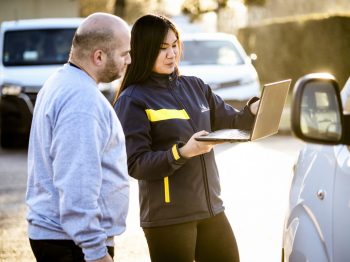Electric vans could be worked harder and charged less, cutting costs and downtime, according to Michelin Connected Fleet.

Its analysis of more than 85,000 fleet records shows electric vans are underutilised, clocking up less than half the daily mileage of ICE-powered vans.
The data science team found the average electric LCV is run for just 28 miles a day compared to 63 miles for an internal combustion-engined (ICE) van – despite eLCVs being more than capable of the longer mileage.
The detailed analysis also found that 59% of electric vehicles are being plugged in when the state of charge is greater than 50% – risking performance and residuals.
Lithium-ion batteries perform best when the state of charge is maintained between 20 and 80%, and the general advice is to only charge the battery fully if you need that additional range for a particularly long journey.
Charging for longer not only negatively impacts driver productivity, particularly given half of charging events occur during the daytime, but could also cause batteries to deteriorate faster, negatively impacting range and residuals.
Alberto De Monte, business segment director for EV and OEM at Michelin Connected Fleet, said: “Range anxiety is clearly impacting the fleet market’s confidence in electric vans, resulting in EVs being overcharged and underworked.
“In most applications, the EVs you buy today have the range to do the job of a petrol- or diesel-powered van in and around cities, but they’re being deployed on the lightest duty work – whilst ICE assets are being worked harder, which is less efficient and increases emissions.”
Analysis by the firm has also revealed that van drivers charged batteries to 90% or higher in 76% of the charging events it studied – in comparison with car drivers who hit 90% or higher in only 58% of instances.
De Monte added: “What we’re seeing points to more guidance being needed for fleets to ensure they are maximising the benefits which transitioning to EVs offer; and not storing up issues which could impact performance and residuals down the line.”
Michelin Connected Fleet offers a dedicated electric vehicle fleet management service, dubbed MoveElectric and designed to help businesses of all sizes to cut fleet CO2 emissions, reduce operating costs and to integrate EVs for the most efficient last-mile delivery strategy.
The service delivers easy-to-use tools to help fleets plan, grow and master all aspects of EV fleet management, from identifying routes to achieving EV roll-out. It forms part of a comprehensive fleet management solution to help connect vehicles, optimise performance, and gain greater visibility across an entire fleet based upon informed data-driven choices

